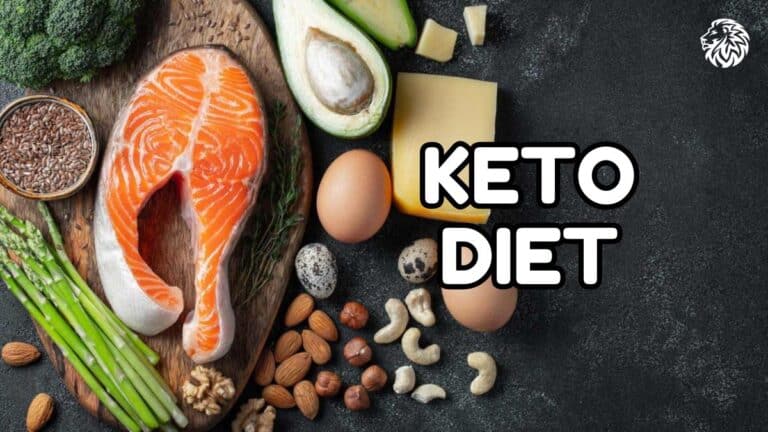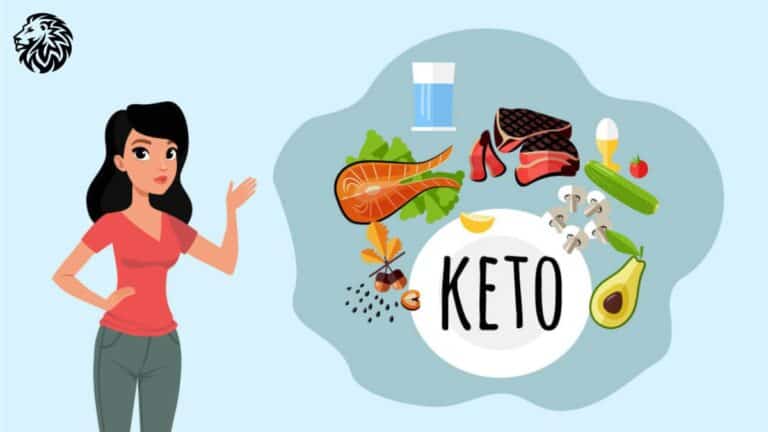In recent years, the ketogenic diet (commonly referred to as the keto diet) has gained significant attention for its potential to aid in weight loss. With its high-fat, low-carbohydrate approach, the keto diet promises quick weight loss by altering the body’s energy production system. However, while some claim it to be a miracle for shedding pounds, others raise concerns about its long-term effectiveness and sustainability. Let’s explore how the keto diet works, its impact on weight loss, and whether it’s a viable solution for long-term health goals.
Understanding the Keto Diet
The ketogenic diet involves drastically reducing carbohydrate intake while increasing fat consumption. Typically, about 70-80% of daily calories come from fat, 10-20% from protein, and only 5-10% from carbohydrates. This approach contrasts with the standard dietary guidelines, which recommend a higher proportion of carbohydrates for energy.
The primary goal of the keto diet is to induce a metabolic state known as ketosis. Under normal conditions, the body uses carbohydrates (glucose) as its primary energy source. When carbs are significantly reduced, the body is forced to find an alternative fuel. In ketosis, the liver breaks down fat into ketone bodies, which then become the body’s main energy source.
This shift in energy metabolism is what makes the keto diet unique. By running on fat rather than carbohydrates, proponents of the diet argue that the body becomes more efficient at burning fat, which may lead to faster weight loss.

How the Keto Diet Promotes Weight Loss
The keto diet’s weight loss potential stems from several factors that work together to reduce calorie intake, increase fat burning, and control appetite. Understanding these mechanisms helps explain why many people experience rapid and often dramatic weight loss when starting the keto diet. Below are the key ways the keto diet promotes weight loss:
1. Calorie Restriction Through Food Elimination
A fundamental reason why people lose weight on the keto diet is the elimination of a broad range of carbohydrate-rich foods, leading to an overall reduction in calorie consumption. Foods like bread, pasta, rice, potatoes, and even fruits are off-limits or heavily restricted, which limits snacking and overall calorie intake. This naturally reduces the variety of food available, making it easier to maintain a calorie deficit without feeling deprived, as high-fat and moderate-protein foods tend to be more filling.
Additionally, high-fat foods such as cheese, avocado, oils, and fatty meats are more satisfying and can lead to earlier satiety. This feeling of fullness helps people reduce portion sizes and snack less, often without having to meticulously count calories.
2. Ketosis and Fat-Burning
The keto diet shifts the body’s metabolism by forcing it into a state of ketosis, where it burns fat for energy instead of carbohydrates. Normally, the body converts carbohydrates into glucose, which is its primary energy source. However, when carbohydrate intake is severely limited, the liver starts breaking down fat into molecules called ketones, which the body uses as an alternative energy source.
This shift leads the body to become more efficient at burning stored fat, which results in faster weight loss. In the early stages, individuals often experience rapid weight loss due to the depletion of glycogen stores (the stored form of carbohydrates in muscles and the liver). Since glycogen binds to water, depleting it results in the loss of water weight. While this initial weight loss is largely water, continuing the diet will eventually lead to fat loss as the body adapts to its new fuel source.
3. Appetite Suppression
One of the keto diet’s most appealing aspects for weight loss is its ability to suppress appetite, which can make it easier for people to eat less without feeling hungry. Several mechanisms contribute to this appetite suppression:
- Satiating Effects of Fat and Protein: Fat and protein are more filling than carbohydrates, and they slow down digestion, helping people feel satisfied for longer periods. This reduces the urge to snack or overeat, a common challenge when trying to lose weight.
- Reduced Hunger Hormones: Research suggests that the keto diet may lower levels of the hunger hormone ghrelin, which signals to the brain when it’s time to eat. With ghrelin levels suppressed, individuals on the keto diet often report feeling less hungry throughout the day, making it easier to stick to a reduced-calorie diet.
- Steady Energy Levels: Unlike high-carb diets that can lead to energy spikes and crashes, the keto diet provides a more stable energy source through fat and ketones. This steady energy reduces the likelihood of hunger pangs that are often triggered by blood sugar fluctuations.
4. Reduction of Insulin Levels and Fat Storage
The keto diet can also influence weight loss by affecting insulin, a hormone that plays a significant role in fat storage. Carbohydrates cause insulin levels to rise as the body processes glucose. High insulin levels promote fat storage, particularly around the abdominal area. By reducing carbohydrate intake, the keto diet lowers insulin levels, which helps reduce fat storage and encourages the body to burn existing fat reserves for energy.
Lower insulin levels also promote the breakdown of stored fat, further aiding in weight loss. For individuals with insulin resistance or metabolic conditions like Type 2 diabetes, the keto diet can be especially beneficial in improving insulin sensitivity, making it easier to lose weight and maintain stable blood sugar levels.
5. Improved Metabolism and Thermogenesis
Another factor contributing to weight loss on the keto diet is the potential boost in metabolism. Studies have suggested that ketogenic diets may increase fat oxidation (the body’s ability to burn fat for energy) and improve overall metabolic efficiency. This means that the body becomes more effective at converting fat into energy, which can support consistent weight loss over time.
Additionally, the process of converting fat into ketones requires energy, which may slightly increase the body’s energy expenditure through a process called thermogenesis. While this increase in calorie burn may not be dramatic, it can contribute to the overall effectiveness of the keto diet for weight loss when combined with reduced calorie intake and enhanced fat burning.
The keto diet’s unique approach to macronutrient distribution helps promote weight loss through multiple mechanisms. By drastically reducing carbohydrate intake, the diet forces the body into ketosis, where fat is burned for energy. Simultaneously, it helps control appetite and reduce insulin levels, further supporting fat loss. Although these mechanisms can lead to rapid and significant weight loss, it’s important to note that individual results may vary, and maintaining long-term weight loss on the keto diet requires careful planning and commitment.

Short-Term Benefits of the Keto Diet
In the short term, many individuals see noticeable weight loss on the keto diet. Studies suggest that low-carbohydrate diets like keto can lead to more rapid weight loss compared to traditional low-fat diets. Some people experience significant reductions in body weight and improvements in certain health markers, such as blood pressure, triglyceride levels, and cholesterol.
One of the reasons for this success is the drastic reduction in carbohydrates, which causes the body to shed water weight quickly. However, after this initial phase, the rate of weight loss typically slows down. Nonetheless, many individuals continue to see steady progress when following the diet closely.
1. Metabolic Improvements
For individuals with metabolic disorders, such as Type 2 diabetes or insulin resistance, the keto diet may offer additional benefits. Because the diet reduces carbohydrate intake, it helps control blood sugar levels, which can improve insulin sensitivity and reduce the risk of diabetes-related complications. Some research suggests that the keto diet can improve glucose control and lipid profiles in people with Type 2 diabetes, making it a potential option for managing the condition alongside weight loss.
2. Enhanced Mental Clarity and Focus
Some keto dieters report improvements in mental clarity and focus. Since ketones provide a steady supply of energy to the brain, some people experience less brain fog and more sustained cognitive function throughout the day. This mental sharpness, combined with the physical benefits of weight loss, is one reason many find the keto diet attractive.
Challenges and Downsides of the Keto Diet
While the keto diet may offer a path to weight loss for some, it is not without its challenges and potential drawbacks. For many, the diet can be difficult to maintain over the long term due to its restrictive nature.
1. Difficult to Sustain
The strict requirements of the keto diet, particularly its significant reduction of carbohydrates, can be difficult to follow for extended periods. Many foods, including bread, pasta, rice, fruits, and even some vegetables, are off-limits or significantly limited. This can make meal planning challenging and may lead to feelings of deprivation. For people who enjoy a variety of foods or who have a strong preference for carbs, the keto diet may feel too restrictive to follow over the long term.
Additionally, the social aspect of eating can be affected by the keto diet. Many people find it challenging to dine out or attend social gatherings where keto-friendly options are limited. The need to constantly monitor macronutrient intake can become burdensome and unsustainable for those with busy lifestyles.
2. Nutrient Deficiencies
Cutting out entire food groups can lead to nutrient deficiencies if not carefully managed. The keto diet eliminates many foods that are rich in essential vitamins and minerals, such as whole grains, fruits, and legumes. This can result in deficiencies in important nutrients like potassium, magnesium, and vitamin C. Without careful planning, individuals on the keto diet may need to rely on supplements to meet their nutritional needs.
Fiber intake is also a concern on the keto diet. Many high-fiber foods, such as fruits, legumes, and whole grains, are restricted, which can lead to digestive issues like constipation. To avoid this, it’s important for keto dieters to prioritize fiber-rich, low-carb vegetables such as leafy greens, broccoli, and cauliflower.
3. Keto Flu and Other Side Effects
In the early stages of the keto diet, many people experience what’s commonly referred to as the “keto flu.” This occurs as the body transitions from using carbohydrates to fat as its primary energy source. Symptoms of the keto flu include fatigue, headaches, nausea, irritability, and brain fog. These side effects typically subside after a few days to a week, but they can be discouraging for those just starting the diet.
Other side effects can include bad breath, caused by the production of acetone (a byproduct of ketosis), and changes in body odor. Additionally, individuals engaging in intense physical activity may find their performance compromised, as the body’s glycogen stores are depleted, affecting endurance and strength.
4. Rebound Weight Gain
One of the main concerns with the keto diet is the potential for rebound weight gain once normal eating patterns are resumed. Because much of the initial weight loss on keto is due to water loss, individuals may regain this weight when they reintroduce carbohydrates into their diet. Moreover, the restrictive nature of the keto diet may make it difficult to maintain long-term, leading to the yo-yo dieting effect, where individuals lose and regain weight repeatedly.
Is the Keto Diet Right for You?
The keto diet can be an effective tool for short-term weight loss, especially for individuals looking to jumpstart their weight loss journey. However, it’s important to weigh the potential benefits against the challenges and risks of long-term adherence. The diet’s restrictive nature, potential nutrient deficiencies, and possible rebound weight gain are all factors to consider.
Before starting the keto diet, it’s advisable to consult with a healthcare professional or registered dietitian to ensure it aligns with your health goals and needs. For some individuals, a more balanced approach that includes healthy carbohydrates may be a better fit for sustainable, long-term weight management.
Ultimately, while the keto diet can lead to weight loss, it is not a one-size-fits-all solution. Each individual’s response to the diet may vary, and success will depend on personal preferences, lifestyle, and the ability to maintain the diet over time.
References
- Rhyu, H. S., & Cho, S. Y. (2018). A low-carbohydrate ketogenic diet reduces body weight and improves physical performance among the Taekwondo athletes. Journal of Strength and Conditioning Research, 32(12), 3373-3381. Retrieved from https://journals.lww.com/nsca-jscr/Fulltext/2018/12000/A_Low_Carbohydrate_Ketogenic_Diet_Reduces_Body.10.aspx
- World Health Organization: obesity and overweight. (2020). Accessed: August 9, 2020: https://www.who.int/news-room/fact-sheets/detail/obesity-and-overweight.
- Santos FL, Esteves SS, da Costa Pereira A, Yancy WS Jr, Nunes JP: Systematic review and meta-analysis of clinical trials of the effects of low carbohydrate diets on cardiovascular risk factors. Obes Rev. 2012, 13:1048-1066. 10.1111/j.1467-789X.2012.01021.x
- Kirkpatrick CF, Bolick JP, Kris-Etherton PM, et al.: Review of current evidence and clinical recommendations on the effects of low-carbohydrate and very-low-carbohydrate (including ketogenic) diets for the management of body weight and other cardiometabolic risk factors: a scientific statement from the National Lipid Association Nutrition and Lifestyle Task Force. J Clin Lipidol. 2019, 13:689-711. 10.1016/j.jacl.2019.08.003
- Kim JM: Ketogenic diet: old treatment, new beginning. Clin Neurophysiol Pract. 2017, 2:161-162. 10.1016/j.cnp.2017.07.001
- Masood W, Annamaraju P, Uppaluri KR: Ketogenic Diet. StatPearls Publishing, Treasure Island, FL; 2020.
- Bueno NB, de Melo IS, de Oliveira SL, da Rocha Ataide T: Very-low-carbohydrate ketogenic diet v. low-fat diet for long-term weight loss: a meta-analysis of randomized controlled trials. Br J Nutr. 2013, 110:1178-1187. 10.1017/S0007114513000548
- Stern L, Iqbal N, Seshadri P, et al.: The effects of low-carbohydrate versus conventional weight loss diets in severely obese adults: one-year follow-up of a randomized trial. Ann Intern Med. 2004, 140:778-785. 10.7326/0003-4819-140-10-200405180-00007
- Mansoor N, Vinknes KJ, Veierød MB, Retterstøl K: Effects of low-carbohydrate diets v. low-fat diets on body weight and cardiovascular risk factors: a meta-analysis of randomised controlled trials. Br J Nutr. 2016, 115:466-479. 10.1017/S0007114515004699
- Mavropoulos JC, Yancy WS, Hepburn J, Westman EC: The effects of a low-carbohydrate, ketogenic diet on the polycystic ovary syndrome: a pilot study. Nutr Metab (Lond). 2005, 2:35. 10.1186/1743-7075-2-35
- Gower BA, Chandler-Laney PC, Ovalle F, et al.: Favourable metabolic effects of a eucaloric lower-carbohydrate diet in women with PCOS. Clin Endocrinol (Oxf). 2013, 79:550-557. 10.1111/cen.12175
- Paoli A, Mancin L, Giacona MC, Bianco A, Caprio M: Effects of a ketogenic diet in overweight women with polycystic ovary syndrome. J Transl Med. 2020, 18:104. 10.1186/s12967-020-02277-0
- Yancy WS Jr, Foy M, Chalecki AM, Vernon MC, Westman EC: A low-carbohydrate, ketogenic diet to treat type 2 diabetes. Nutr Metab (Lond). 2005, 2:34. 10.1186/1743-7075-2-34
- Valenzano A, Polito R, Trimigno V, et al.: Effect of very low calorie ketogenic diet on the orexinergic system, visceral adipose tissue, and ROS production. Antioxidants (Basel). 2019, 8:643. 10.3390/antiox8120643
- Gardner CD, Trepanowski JF, Del Gobbo LC, et al.: Effect of low-fat vs low-carbohydrate diet on 12-month weight loss in overweight adults and the association with genotype pattern or insulin secretion: the DIETFITS randomized clinical trial. JAMA. 2018, 319:667-679. 10.1001/jama.2018.0245







